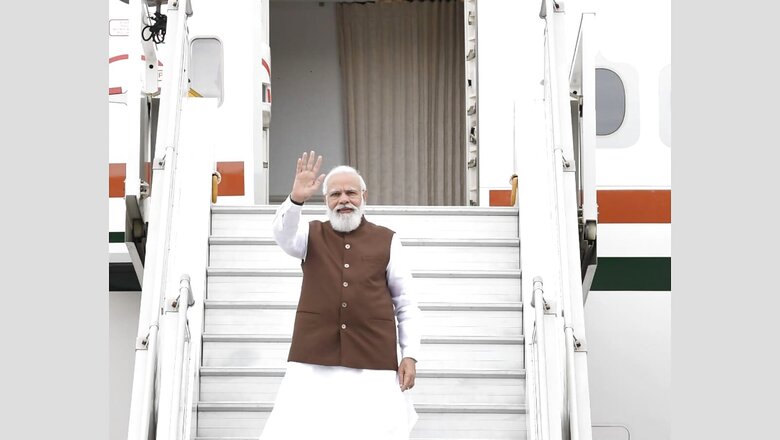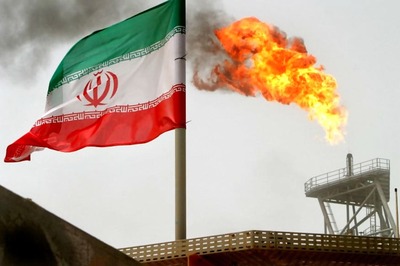
views
Prime Minister Narendra Modi’s visit to the US comes at a particularly critical juncture, what with India’s security and strategic environment having been seriously disturbed both to her east and her west. That the part of the world India is located in is in a flux is only stating the obvious. Events in the region and beyond are moving at a bewildering pace, especially after the fall of Afghanistan to the Taliban. New strategic alignments and alliances are taking shape, even as old relationships suddenly seem to have regained their relevance. Old threats are re-emerging, and that too in a far more destabilising and destructive way. The certainties of the yesterday are being replaced by the uncertainties of future. It is in these very fraught times that Narendra Modi will be attending the first ever in-person meeting of the leaders of the four Quad countries—US, Australia, Japan and India. Equally consequential will be his first bilateral with the US president, as also his meetings with the Prime Ministers of Japan and Australia.
These meetings come at a time when the Biden administration has shifted its strategic focus to the Indo-Pacific and the looming competition, contestation, and even confrontation with an increasingly aggressive China. The strategic challenge and threat posed by China will of course be central to the discussions in the Quad framework. But so far the Quad has focused not so much on combating the military aspects of the threat that China poses but more on the non-military dimension of the challenge. Cooperating and coordinating on supply chains, developing critical technologies, dealing with climate change, ensuring connectivity and infrastructure development are things that are supposed to form the bedrock of the partnership between the Quad countries. The importance of working together on these areas should not be underestimated. These are all necessary components of the non-military side of a forward-looking strategy to undercut the competitive edge that China currently enjoys. The only problem is that these do not address the clear and present military threat that China poses to not just its smaller neighbours but also some of the Quad countries.
ALSO READ | AUKUS Can Complement Quad But Its Timing Dilutes First In-Person Summit on September 24
Despite the Quad having come a long way in the last few years, the member countries continue to pussyfoot around the issue of transforming it into some kind of military alliance. Addressing the UN General Assembly, US President Joe Biden declared that his country did not seek a new Cold War. For their part, the Indians have been quite emphatic is stating that Quad is no Asian NATO. There seems to be a hesitation, even reluctance, to move in the direction of a formal military alliance. Although all four countries have been engaged in very close security cooperation at the bilateral, trilateral, quadrilateral and multilateral level, this cooperation is limited to joint exercises and consultations. There has also been a degree of coordination of their approaches—for instance on freedom of navigation and reiterating their commitment to a rules-based order. But that’s about it. Whether the meeting in Washington will push things on the military front isn’t entirely clear. After the recent military pact between Australia, UK and US (AUKUS), there is a chance of something similar being put on the Quad table. But even if this was to happen, it will take a lot of discussion before something is finalised. Meanwhile, China is busy building its own alliances without any of the constraints and restraints that seem to be dogging the Quad countries.
Before the Quad meeting, Prime Minister Modi will have his bilateral with President Biden. This will be a crucial meeting in determining the future trajectory of India-US relations. While the relationship remains strong overall, there are some rather unnecessary irritants—democracy, civil rights etc.—that have crept in and started to impinge on the bilateral ties. Having a conversation on these issues will offer an opportunity to correct and push back on some of the misconceptions and misperceptions that have been deliberately created and peddled by the usual suspects in India and outside. But there are also some emerging areas of divergence, which have gained greater salience over the last few weeks—Afghanistan, Pakistan, Russia and Iran. These will need to be addressed because they could impact not just the bilateral relationship but also the Quad.
Unlike the other Quad countries which are an ocean and a continent away from Afghanistan, India is virtually on the frontlines of the terrorism that is likely to emanate from there. With the Americans having abandoned Afghanistan, India will have to explore new options in the region. This includes reviving, rebuilding and re-energising her ties with two of the bête noire of the US—Iran and Russia. Although the position of both these countries on Afghanistan remains fluid for now, these two offer India the best chance to stay in the game and protect her interests. But will the Americans be ready to cut some slack for India? Or, will they insist that India adheres to the sanctions regime that they have imposed, which will confront India with a terrible dilemma.
India will also want to get some clarity on how the US intends to combat terrorism in the Af-Pak region. Clearly, the ‘over-the-horizon’ (OTH) operations are a little over the top. They are not really going to work, even less so if it means using Pakistani airspace and/or sharing intelligence and getting into security cooperation with the Taliban (and by extension the Haqqani Network and Al Qaeda). Will the Americans once again fall for Pakistani deceit and deception and ease the financial and diplomatic pressure on both Afghanistan and Pakistan, which in turn will further strengthen India’s enemies on her western front? Will the US seek basing rights in India to conduct some of its OTH operations? Will India be open to giving such facilities to the US, especially given the political repercussions of such a move? Is it even practical for the US to use India as a staging area for OTH operations given that it will still need to use Pakistani airspace, which might not be available to it for drones or aircraft taking off from India? If such bases do come up along India’s western border, then why not allow similar bases or at least listening posts along India’s northern and eastern border with China?
Quite obviously, not everything will be sorted out in the meetings that Modi holds with Biden or with the other Quad leaders. But the hope is that the Prime Minister will come back with at least a clear sense of direction in which the Quad and the bilateral relationship with the US is heading. On this will depend the policy choices India makes going forward.
The author is Senior Fellow, Observer Research Foundation. The views expressed in this article are those of the author and do not represent the stand of this publication.
Read all the Latest News , Breaking News and Ukraine-Russia War Live Updates here.



















Comments
0 comment